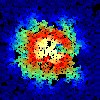Probability Seminar
The incubation period for typhoid, strep, leukemia, bladder cancer, and many other diseases follows a right-skewed, approximately lognormal distribution. Although this pattern was discovered over sixty years ago, it remains an open question to explain its ubiquity. Here we propose an explanation based on evolutionary dynamics on graphs. For simple models of a mutant or pathogen invading a network-structured population of healthy cells, we show that skewed distributions of incubation periods emerge for a wide range of assumptions about invader fitness, competition dynamics, and network structure. The skewness stems from stochastic mechanisms associated with two classic problems in probability theory: the coupon collector and the random walk. Unlike previous explanations that rely crucially on biological heterogeneity, our results hold even for homogeneous systems. Thus, we predict that two equally healthy individuals subjected to equal doses of equally pathogenic agents may, by chance alone, show remarkably different time courses of disease.
